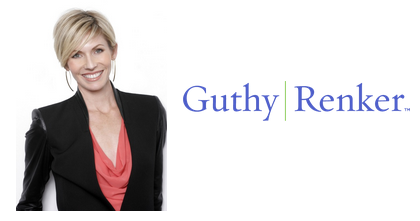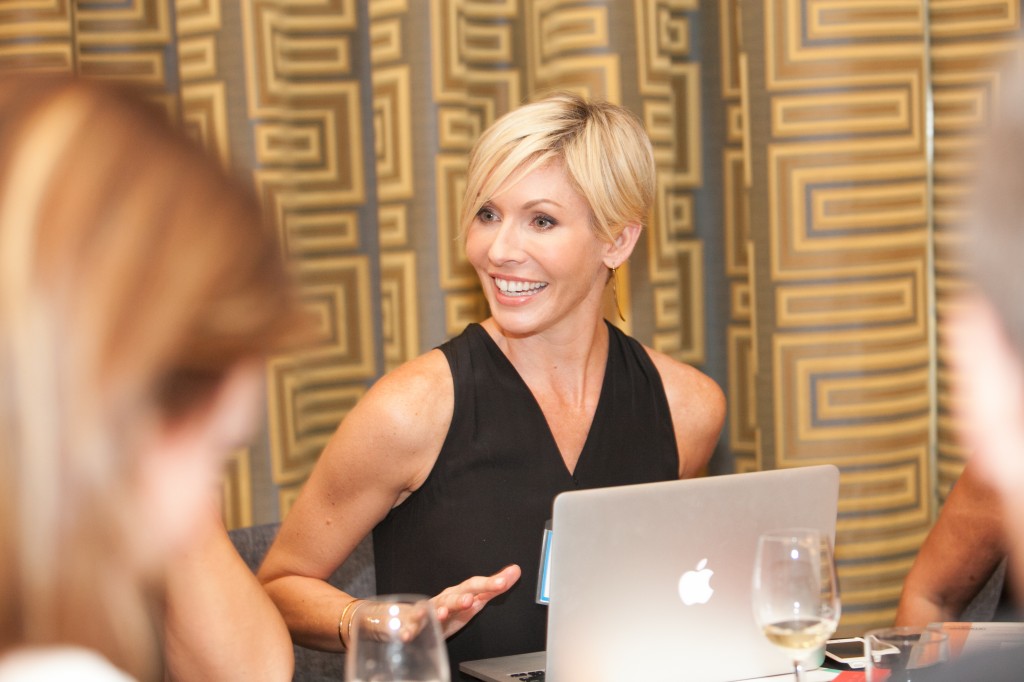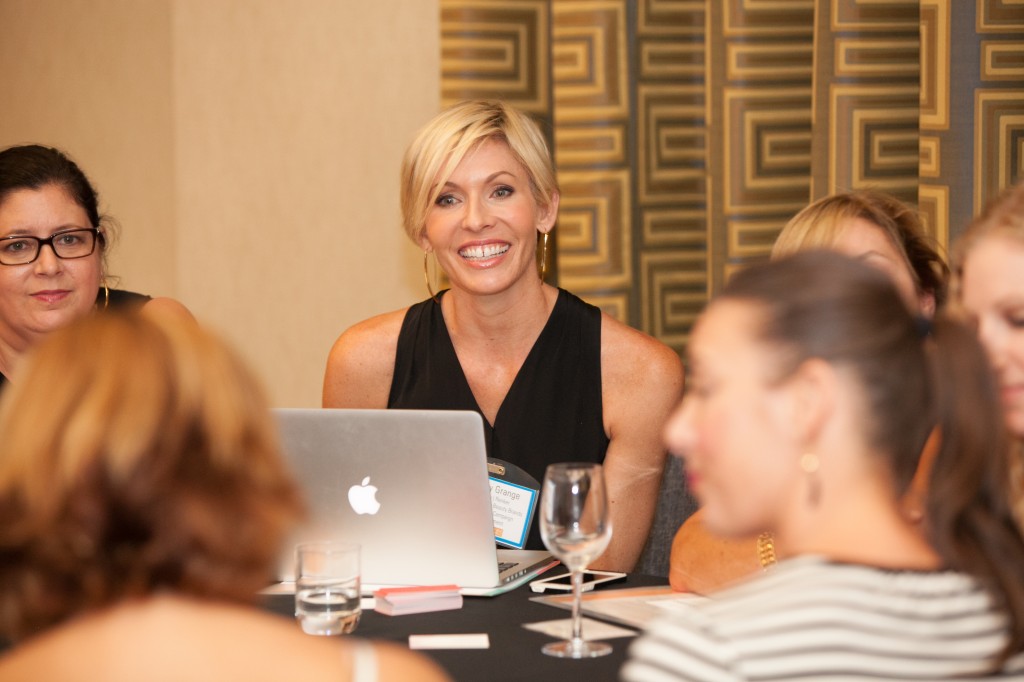November 17, 2014
How to Build Direct-to-Consumer Engagement by BBR11 Thought Leader, Carey Grange
November 17, 2014
How to Build Direct-to-Consumer Engagement by BBR11 Thought Leader, Carey Grange
“Don’t just OWN your customer, KNOW your customer.”
Beauty Biz Roundtable 11 Thought Leader and a Consultant on Beauty Brands Strategy & Campaign Development for Guthy | Renker, Carey Grange, shared her expert advice on how beauty brands can drive consumer engagement.

Carey Grange is founder and managing director of SkinnyPants, Inc., a brand development agency that brings emerging beauty brands to market, from product conception and positioning to business and marketing strategy to campaign creation and execution. Working with companies like marketing powerhouse Guthy | Renker, SkinnyPants campaigns leverage digital and video media to create impact, drive measurable response and engage the consumer.
Prior, Carey served as President and partner of TEMPTU, a pioneer in airbrush makeup, re-launching and expanding the brand through a multi-channel distribution strategy. Carey’s executive beauty experience also includes nine years at clinical skincare leader, Murad, as its EVP, Direct to Consumer and General Manager, Global Marketing.
Please share three key points from your BBR11 roundtable presentation, “Building Direct to Consumer Engagement: Navigating New Media to Directly Engage Customers & Drive Growth.”
- The customer is calling the shots.
The old Direct to Consumer (D to C) adage was “your database is your goldmine,” but really it should be “your customer is your goldmine.” Your customer is also now calling the shots.
- OLD: Work your database to optimize the Lifetime Value (LTV) of your customer.
- NEW: Use our database tools to ENGAGE your customer, and expand your media reach to be in the places where customers are engaging other customers
The way our customers consume information is changing at a rapid clip. If you want to stay relevant, change your commerce, your business model, and the way you talk to your customer.
Successful modern brands engage those customers beyond the old-school D to C transactional marketing methods and use those tools to develop a relationship with their customers, personalize the experience, give to the relationship (versus just take) and build community through experiences that aren’t directly related to the sale. Brands that do this really well: Red Bull, Nike, and Skechers.
- Your brand mission will determine your business model. I took this from an agency, Javelin, that I did some work with.
Your business model drives the types of interactions your customers can have with you. As Forrester explains, “How can your customers interact with you? Can they buy your products and services directly from your mobile app — or do they need to go to a brick-and-mortar third-party retailer? Do you have self-service customer support on your website — or do your customers call an outsourced call center when they need help? The answers to these questions are deeply rooted in your company’s business model.”
- The successful, modern direct to consumer brands are truly customer-centric versus campaign centric.
We all think we are Customer-Centric; we LOVE our customer, and we want our customers to LOVE us. We’re nice to them when they call with a complaint. We attempt a response within 24 hrs. But what does it truly mean to be Customer-Centric?
Think of Customer-Centric as a Verb, not an Adjective. This will impact your policies, investments and strategies for IT, customer service, returns, product development, marketing and distribution.

Please tell us about your career path. How did you get started?
My second job out of college landed me at direct response marketing powerhouse, Guthy|Renker, where I was hired as a marketing coordinator. G|R was still relatively in its infancy at the time and highly entrepreneurial, so very quickly I was able to gain broad experience and carry a lot of responsibility managing pretty big beauty lines, including Proactiv. From there, I began working as a true entrepreneur, consulting on other beauty brands in the direct response space, helping develop emerging celebrity-based brands. After a short stint working in marketing and product development for a skin care manufacturing company, I decided I wanted to get back into direct response, and landed a job at Murad, who was re-launching its infomercial business. That’s where I really found my home and a love for brands, and developed both an appreciation and passion for the power of being multi-channel and engaging your customer through multiple touch points. I was with Murad for nine years, where I served as both its General Manager of Global Marketing and its EVP, Direct to Consumer. I left Murad to become president and partner at Temptu, Inc., the leader in professional airbrush cosmetics. For the past two years, I’ve been operating a brand development agency and doing consulting work for my “alma matter”, Guthy|Renker, on beauty brands strategy and campaign development.
Why did you choose this career?
When I got my job at Guthy|Renker in my early 20’s, I received a job as an office manager for an architecture firm in downtown LA the same day. It was a no brainer! As a product junky, who could resist working on beauty brands? I quickly developed an affinity for direct response marketing and loved the entrepreneurship of G|R. I just never thought twice about it. The rest is history.
Who are your biggest career influencers?
I always feel like the consumer has been a big career influencer. Because I’ve always worked in a business where I had direct access to her, I’ve felt a personal relationship to the consumer and have been motivated to provide great products and services that women love and respond to. From an executive stand point, I love women like Joanna Coles, who is now editor of Cosmopolitan magazine. She is feminine and stylish but confident and powerful – the true postmodern executive woman. And I truly admire Bill Guthy and Greg Renker, who built a marketing powerhouse. I feel really fortunate to be working with them again at this stage in my career.
Who is today’s beauty consumer? How are they changing?
Technology has changed the way consumers consume information, make purchase decisions and where they actually purchase. There are so many naturally occurring communities with women sharing information and supporting each other in their self-improvement pursuits. This has created a great platform for new brands to launch, and it has also taken the power from the marketing companies and put it in the hands of the consumers. It’s no longer brands selling to consumers…it’s consumers selling to consumers. Smart, modern brands are figuring out how be engaged in that conversation.
What do brands need to do to connect with today’s beauty consumer?
It’s not enough to purchase glossy ads and have pretty shelf-talkers. Today’s consumers are consulting with each other online, through naturally occurring communities, where they share information, critique products and even document results. Brands need to figure out how to be a part of that conversation and they need to factor that non-measurable influence into their consumer touch point strategy. It’s also important for brands to have a social purpose. I learned recently from Javelin, an ad agency I did some work with, that “94% of consumers say they are likely to switch brands, similar in price and quality, to one that supports a social issue.” I really encourage brands I work with to go beyond the traditional “take” of marketing, which is, I tell you why you need this product, and you buy it. There needs to be give, both to the consumer and to the external world.
What do you see as the latest trends in your industry?
With direct response being the key media driver with the brands I work on, I consistently see the following elements being essential to success:
- Demonstrational results
- Clinical proof
- An innovative and differentiating USP (an ingredient story, for example)
- A passionate and credible founder/spokesperson
- Social proof: testimonials, customer reviews, etc.
- Value
In terms of actual product categories, multi-functional products continue to be big movers, as busy women want the functionality and value of fewer products doing more.
Proactiv was a huge innovator in bringing dermatology to the consumer for acne treatment, and with all the cosmetic procedures today, other high performance brands are gaining traction (ex. SkinCeutical TNS Serum).
As for market categories, there’s so much untapped potential in ethnic markets. The Baby Boomer market potential can’t be denied and is still pretty untapped.
 What attributes make a great leader?
What attributes make a great leader?
My personal feeling is that great leaders don’t need to have the answers, but they do need to make decisions. Great leaders are clear about the direction they want to go in but deploy their people to take action to get there and be a part of the strategy and the solution. This means things don’t always get done exactly the way you might do it, but your team members will feel supported and more emotionally invested, and chances are, they’ll do things better than you would have anyway! Also, making decisions is critical. You can always change course, but I think it’s too easy to forget that no decision or a delayed decision is nonetheless a decision. It’s basically a decision to do nothing, which only fosters apathy, frustration and ultimately lost opportunity.
What kinds of qualities do you look for when hiring a candidate to join your team?
I always love someone with great energy and confidence, who can articulate ideas and demonstrate a history of accomplishing goals without being micromanaged. I love self-driven people who see possibility and then lay the groundwork to get there. I move quickly and like to accomplish a lot in a short period of time, so I value people who don’t require micromanagement and can quickly find solutions and push things forward. You will also capture my heart if you use the word “we” instead of “I.” “We” screams team player. Your accomplishments will speak for themselves. But if you’re a “we” player, we’re going to get along great!
Carey began her career at Guthy|Renker, managing worldwide brands including Proactiv, Principal Secret and Victoria Jackson Cosmetics. Carey holds a BA in English Literature from Pepperdine University and completed the Women’s Leadership Institute at the UCLA Anderson School of Management. She recently served on the board of the Electronic Retailing Association and is a current board member of Iconic Labs.
Brows, Beauty & Business: BBR11 Thought Leader Q&A: Chris Kolodziejski, CEO – Chella Brow

